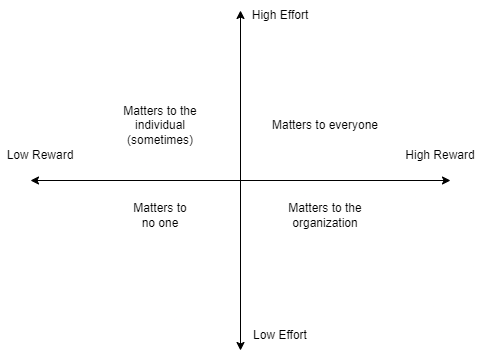What does it mean to work on a software initiative that “matters”? When we’re interviewing for a job, obviously the vision of the company “matters” – we don’t want to work for someone who we don’t agree with or believe in long-term. But what about on a smaller scale, on the size of an initiative that might take a developer, say, a few weeks, or maybe involves a lot of up-front design, or represents some work that’s needed but not desirable?
This has been one of the things I was thinking about in my own career as I’ve taken on a project that I’m not entirely comfortable leading, but is really exciting in terms of “mattering”.
The Four Quadrants of “Mattering”
A piece of common advice when talking to individual contributors about their career advancement, promotions, and higher recognition in general is to pick projects that suit their goals. It boils down to selecting initiatives that matter for their particular needs. It’s important that we distinguish what matters from two perspectives – personal goals and business goals. From a personal perspective, an IC might choose to pick something that showcases a high degree of technical prowess, communication skills, or other useful skill. For an organization, especially one with business incentives, the goal might be to increase revenue, decrease cost, or some combination of efficiency improvements thereof.
We can represent this in four separate quadrants:

Based on this, we can begin to understand what “matters” to our individual situation.
If you’re targeting that big promotion, you might want to look at low-effort, high-reward projects if the reward is high enough, or high-effort, high-reward projects if your organization also values those attributes. If you’re looking for personal growth, a good project might be along the top two quadrants as the high level of effort always brings learning opportunities through challenge.
One thing is for certain, though – stay away from low-effort, low-reward tasks. Not only are they “empty” in terms of personal fulfillment, but the fact that your organization also doesn’t value them means that you will not gain any career advancement points from them, either.
One Final Note
I hope that brings some clarity to choosing which projects you work on (if you’re able to do so). It’s important to pick the right project for your needs, as well as for your organization or employer.
I will offer one final word of warning on the high-effort, high-reward projects: they can be stressful. Businesses target high reward projects precisely because that reward is often financial. That means there is often lots of pressure to complete the work quickly to capitalize on potential gains. Before selecting a project like this, make sure you are capable of handling that extra scrutiny (either via management support or just coping with stress in general) to set yourself up for success.
That’s all for now. Thanks for reading!
